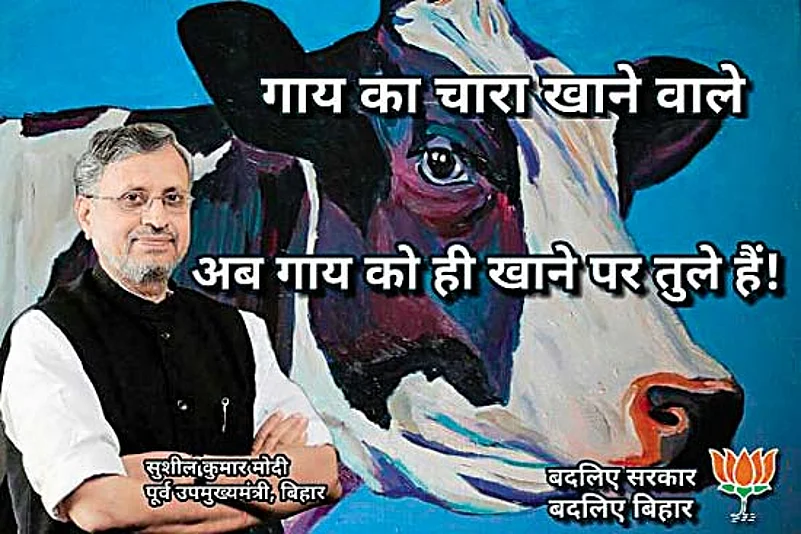Those who know the mild-mannered and soft-spoken Sushilkumar Modi squirmed at this tweet which came out of the BJP leader’s account: Gai ka chaara khane wale ab gai ko hi khane par tule hain (those who ate up fodder for the cow are now bent on eating the cow itself). “This is not the Sushilkumar I know,” declared one of them, adding that he must have been forced to tweet it. Retweeted 155 times in the next 48 hours and marked favourite 107 times, the tweet with a cow in the background and Modi in the foreground was a barb aimed at RJD leader Laloo Prasad Yadav, who had allegedly defended beef-eating by asserting that even Hindus ate beef. It triggered a war of bellicose words, with Laloo tweeting back that he had reared cows all his life, had 100-150 of them and that people who reared dogs should not talk about cows.
The BJP did try to latch on to Laloo’s perceived ‘insult’ to cow-rearing Yaduvanshis, the Yadavs, and drive a wedge in the community seen as rallying around the RJD-JD(U) alliance. Sushilkumar also tweeted a promise that the “next NDA government in the state” would ban cow slaughter. Reminded that cow slaughter was banned in Bihar way back in 1955, he recovered to say that the ban, ineffectual so far, would be implemented strictly by the NDA.
Politicisation of the cow, people say, is a relatively recent phenomenon in the state, where Muslims and Hindus have largely lived in composite neighbourhoods, especially in villages. A Muslim professional married to a Brahmin recalled a light-hearted banter between a Muslim woman going out to buy beef and her Hindu neighbour in a village. “Can human beings eat cows,” the Hindu neighbour taunted, to which the Muslim lady replied, “I eat just half a kilo, don’t you eat the whole cow?” in a not-so-veiled reference to the neighbour selling cows to the butcher after they stopped giving milk. The conversation, he remembered from his childhood, had ended with good-natured laughter on both sides.
The raging controversy has not stopped people from flocking to stalls in Patna selling ‘Bihari kababs’ made of buff meat. Cow meat, says a stall owner, is more expensive and while one can tell the difference in some preparations, it’s less perceptible in kababs.
A Muslim professor of Magadh University in Gaya confirms that cow meat consumption has dropped significantly in recent months. On Bakrid this year, he said, he found many Muslims sacrificing goats. “Mind you, sacrificing a goat is an expensive proposition,” he says, “because they can cost anywhere between Rs 15,000 and Rs 50,000.” A cow on the other hand not only costs less but several families can share its meat. “The difference is significant because a family may pay Rs 2,500 for some cow meat but would have to pay a lot more if each family were to sacrifice a goat.”
In large parts of Bihar, people maintain, cow slaughter does not take place at all. In Arrah and adjoining districts, for example, Muslims have traditionally put mutton on the table. In Patna, beef is available only on the outskirts, elsewhere people make do with buff meat.
They emphasise that it’s not as though Islam sanctions eating beef; it’s the camel which is sacrificed in several Islamic countries. “It’s just that the poorer Muslims here cannot afford to pay Rs 450 for a kilo of mutton; with beef available till recently for as little as Rs 120 a kilo, they found they could afford it.”
But not any more. Citing vigilante groups affiliated to the Sangh parivar, policemen “have hiked their rates as have transporters citing the risk of getting killed. The murder of Mohammed Akhlaq in Dadri has also dampened the sale of cow meat.”
Mohammed Shabbir, 27, who sells shoes in Jehanabad, had a few questions, though. Pointing to reports on the Dadri killing in a Hindi newspaper, he asked this correspondent, “Is it true that beef is our number one export? And reports that the Modi government has reduced the import duty on machinery used to cull milch animals?”


























